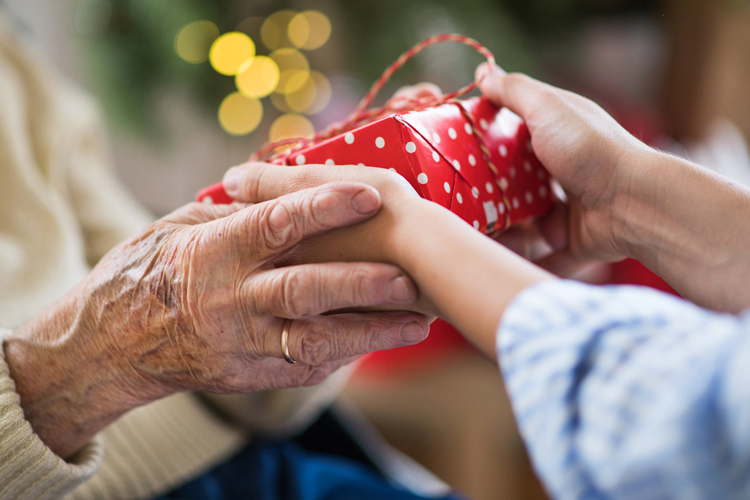For many families the holidays are filled with togetherness, sharing, laughter and memories. However, holidays can also be stressful and tense even for people with healthy brains. For the 6.5 million Americans living with Alzheimer’s Disease and other dementias and their caregivers, the holidays can also be stressful, frustrating, and impacted by a sense of loss and grief.
You may notice your relationships and holiday traditions changing. Just like your loved one living with dementia, you may be feeling overwhelmed. Trying to maintain family holiday traditions while also providing care for a loved one living with dementia can be difficult. You may be feeling hesitant about inviting family and friends over to share the holiday for fear they will be uncomfortable with the changes they see with your loved one who is living with dementia.
So how can you make this holiday experience better for you and your loved one? We have compiled six suggestions for creating a comfortable and joyful holiday season.
Six Tips for a Better Holiday Experience with a Loved One with Dementia
1. Simplify your traditions. Consider simplifying your holiday traditions to relieve stress and expectations on yourself and on your loved one living with dementia.
 For example, change your holiday meal from dinner time to lunch time when your loved one is more alert and engaged. Instead of cooking for everyone, make your holiday meal a potluck and ask your guests to bring a dish, or order your meal from a restaurant.
For example, change your holiday meal from dinner time to lunch time when your loved one is more alert and engaged. Instead of cooking for everyone, make your holiday meal a potluck and ask your guests to bring a dish, or order your meal from a restaurant.
A smaller, more intimate gathering might be more manageable and meaningful. Don’t be afraid to ask for help from your family, friends and your support community (faith group, community volunteers, neighbors, home care).
2. Prepare family and friends. Connect with family and friends prior to your holiday gathering and let them know of the changes in communication and appearance they may notice with your loved one.
Ask everyone to wear a name tag – you can make a game out of it, and it may help reduce stress for your loved one. Offer tips for positive and meaningful connection, how to recognize the signs of distress, and what to do to help reduce distress in those situations.
Body language can be a tell-tale sign of anxiety in your loved one. Fidgeting, tapping, rubbing the face or knee, wringing hands and bouncing the leg are just a few examples of discomfort or an unmet need like needing to use the restroom.
Ask your guest(s) to simplify communication and offer talking points. Include the person in conversation and in social engagement.
3. Set up your holiday space for success. Wherever you’ll be celebrating the holidays, creating a calm, supportive environment for your loved one can help them remain comfortable throughout your gathering.
 Keep the background noise low, i.e. music low and the television off. Instead of having multiple conversations and talking over each other, guide guests to speak one at a time. Direct kids and pets outdoors to minimize loud screaming, barking, toys and clutter.
Keep the background noise low, i.e. music low and the television off. Instead of having multiple conversations and talking over each other, guide guests to speak one at a time. Direct kids and pets outdoors to minimize loud screaming, barking, toys and clutter.- Be mindful of the room temperature – being too cold or too hot may cause distress for your loved one.
- Ensure there is ample light to see faces, food and walking paths.
- Use different and contrasting colors when setting the dining table (placemats and dishes) to provide visual cues for your person.
- Create a quiet and comfortable space for your person to retreat, rest and restore.
- Prepare activities that help the person unwind, such as watching a familiar movie, listening to favorite music, going for a walk or folding laundry.
4. Consider these tips for communicating with a loved one living with dementia.
- Identify yourself and address the person by name.
- Avoid saying, “Don’t you remember…” Instead, use the phrase, “I remember when we…”
- Pay attention to your tone of voice and volume – dementia does NOT mean deaf.
- Show your interest by maintaining eye contact.
- Speak slowly and clearly.
- Ask one question at a time, and allow as much time as they need to process and respond.
- Resist pointing out the use of incorrect words, terms, names, dates or times, or arguing.
- Go with the flow. Be flexible and ready to change plans and conversations.
- Focus on feelings, not facts. They may not remember your face or your name, but they will remember how you make them feel.
These tips are also available as a downloadable resource that you can share with family and friends.
5. Focus on joyful engagement. Planning intentional opportunities for connection between your loved one, yourself, and other guests can help make your gathering a positive and joyful experience for all.

- Include your loved one in the preparation for the holidays and modify the task to meet their abilities. For example: if they can no longer follow a recipe, ask them to help mix in and stir the ingredients you hand them. Whether we live with dementia or not, we all want to feel like we contribute and add value to celebrations.
- Create a playlist or a collection of your loved one’s favorite music and play it during your holiday celebrations. Invite your loved one and guests to dance to the music.
- Work on a holiday craft together, such as a floral centerpiece, a collage, painting or wrapping presents.
- Make a holiday dish or bake a holiday loaf or cookies together.
- Offer lots of hugs, smiles and laughter.
- Be sure your guests acknowledge the person when they come in your door and when they leave.
- Incorporate physical activity such as taking an outdoor stroll, tossing a football, washing and drying dishes.
- Ask the person to help you set up for the holiday festivities to the best of their abilities.
- Thank the person for their help and let them know how much they mean to you.
6. Take a moment to care for yourself. For those caring for a loved one living with dementia, the holidays can add stress to what may already be an overwhelming time. Be compassionate with yourself and reach out to others for support when you can.
- Take time to step away, mingle and enjoy yourself. Accept offers from family and friends to provide you with moments of respite.
- Don’t hesitate to ask others for help, and be specific in your responses when others ask how they can help.
- Ask guests to pitch in with meal preparation or run errands ahead of your gathering.
- Take photos and videos to record special and humorous moments.
With a little preparation and empathy, you can experience joyful holidays with a loved one with dementia.
Additional Resources
In a recent conversation about surviving and thriving as a caregiver, Christian Living Communities President and CEO Jill Vitale-Aussem, Mary Daniel, nationally known caregiver advocate, speaker, and founder of the Caregivers for Compromise Facebook Group, and Cameron Crawford, owner of Next Steps Senior Placement discussed how important it is to care for the caregiver.
Denver Metro Area
Grand Junction
Colorado Springs


